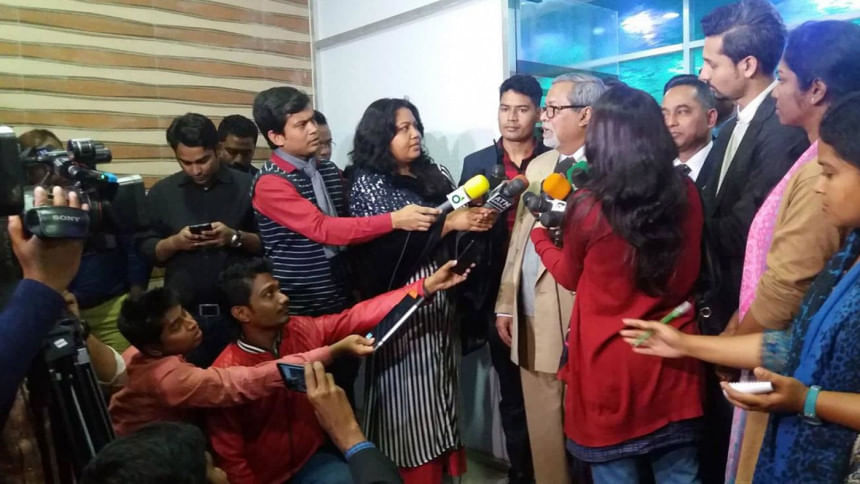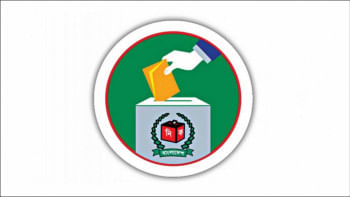A tale of two elections

Gokahle's tribute, "What Bengal thinks today, India will think tomorrow", reflected the leading role that Bengal was taking in the anti-British movement. His view about Bengal's enterprising proclivities and innovative capabilities has proved to be so prescient as to be relevant even more than a hundred years after it was expressed. This innovative prowess still remains in the realm of politics, at least in Bangladesh, but in a very convoluted and intricate manner that has twisted the definition of politics and desecrated the hallowed principles of democracy manifesting, consequently, in a tarnished version of it. And what we have done with our electoral process has been picked up in the US for subverting the will of the people.
Today's topic has been provoked by what our inimitable Chief Election Commissioner said after polls of by-election to two parliamentary seats on November 12. The by-election was held at the same time when the US presidential polls had ended and counting was going on. Our by-election result was as predictable as all the previous elections since the last decade. It was not surprising that more than 80 percent of the votes were cast. The versions of the CEC and of one of the election commissioners Mahbub Talukdar, about the election is highly contrasting, but we need not embark on a flight of imagination to conclude who is telling the truth, given our experiences of the past elections. But this piece is not about our election; in any case, writing about our elections would be a waste of time and energy. Because, as Trump had said about the pandemic after nearly 200,000 people in the US had died of it, "it is what it is", accepting a fait accopmpli since there was precious little he was capable of doing, or willing to do about it. For us too, democracy is what it is—a unique version that demands adding a new chapter, if not writing an entirely new book on political science.
Watching the 2020 US elections, the events leading up to the November 3 polls, and the monkey business resorted to well after three weeks of the polls being cast, one was pervaded with a horrible sense of deja vu. The shenanigans we have witnessed in the US, and are still witnessing is a fun-house-mirror image of our own situation in some respect. The CEC had remarked that the US had much to learn from Bangladesh as to how to conduct an election. He was rather outdated, because it seems that Trump, given the way he has gone about conducting himself before, during and after the election till date, has already picked up quite a few tricks from our methods of politicking, electioneering and hogging an election. We can take some skewed pride that the president of the greatest democracy in the world has taken cue from the manner of conduct of our elections.
But there are a few remarkable differences. As the saying goes, the water of the Ganges in the US has flowed upstream. It was not the opposition that was crying foul about the election; it was not the Democratic nominee but the sitting president who contested the results in all the swing States. In fact, he behaved exactly the way our opposition does. He feared foul play predicting his victory provided the election was "free and fair" and after the results became evident, made it a "heads I win tails you lose" matter. But of course he was proved wrong; the US institutions, despite the US president's tantrums and accusations did not sacrifice their integrity. The election volunteers and they belonged to both the parties, rose above their political identity and did what was their moral duty. However, for us the oppositions' cry of foul play turns out to be true, most of the time. The evidences bear out the allegations, and despite the legal stamp of validity in the court of law, it remains a questionable election in the court of public opinion.
Mr Huda should know why, as he said, the US cannot finish counting ballots in 4-5 days but we can do it in 4-5 minutes. In venting his false pride he not only betrayed his abject ignorance of the US election process, he also exposed our tainted and sullied electoral system. He flaunted the speed with which our votes are counted, but overlooked the reason why that is possible. He forgot that for some voters in our case, the time for casting votes commences much before the schedule (at 8:00 am) in the morning and the bulk of the ballot boxes are stuffed well before the voting starts officially. That is the norm. Therefore it is no wonder that our counting takes so little time. One would not be surprised if in future the counting ends even before the start of voting, much like in some polling centres in the last general election, where the number of votes cast were higher than the actual number of authorised voters in the list!
Unlike in our case, the sitting head of government in the US went to court and resorted to litigation, and all, but all the cases were thrown out, being without merit. Hardly, have we seen our ruling party castigating the system and running down the democratic institutions or putting forward a national conspiracy theory. That is the exclusive preserve of the opposition. The incumbent US president peddled the conspiracy theory and excoriated almost all his agencies for doing what is right by law.
The CEC had also uttered another piece of gem—we have something to learn from the US elections too. Indeed we have. For example, the litigations were dealt with quickly, unlike for example in one instance when the result of a parliamentary seat was contested, soon after the result and the court verdict came only after the term of the parliament was over. The verdict was in favour of the plaintiff, that means that the defendant occupied the seat illegally and thus all the benefits that accrued to him owing to that was illegal. Has the EC done anything in this regard?
I do not believe that the US has anything to learn from Bangladesh, if anything its institutions have emerged stronger than before. Ours get weaker by the day. Trump has sacked the head of the US head of cyber security—for doing his job and ensuring the integrity of the system. Ours gets accolades for being partisan. We have much to learn from the US—first and foremost integrity of character of those who run the electoral system. I cannot give a one word definition of integrity. But can tell you what it is. It is when you look in the mirror first thing in the morning and don't feel ashamed to see the person you see in it. I wonder if all those who conduct our elections feel embarrassed to look in the mirror in the morning, particularly after an election.
Brig Gen Shahedul Anam Khan, ndc, psc (Retd), is a former Associate Editor of The Daily Star.

 For all latest news, follow The Daily Star's Google News channel.
For all latest news, follow The Daily Star's Google News channel. 



Comments